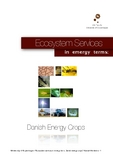Mostrar el registro sencillo del ítem
Ecosystem services in emergy terms: Danish energy crops
| dc.coverage.spatial | east=12.63691027344646; north=55.59929731343336; name=Dinamarca | |
| dc.creator | Montesino San Martín, Manuel | es_ES |
| dc.date.accessioned | 2011-01-28T09:20:43Z | |
| dc.date.available | 2011-01-28T09:20:43Z | |
| dc.date.issued | 2010 | |
| dc.identifier.other | 0000577247 | es_ES |
| dc.identifier.uri | https://hdl.handle.net/2454/2169 | |
| dc.description.abstract | Currently, benefits generated by natural environments, such as carbon sequestration or water retention and others, are measured in economic terms based on “willingness to pay” of society (using the TEV or Total Economic Valuation). Thanks to these measurements, decisions can be made about items related to natural ecosystems in the field of politics, construction projects and quantification of financial aids for the agricultural sector. However, a group of scientists involved in Environmental Economy, thinks that this method is not suitable, as society do not really know the true value of the functions of the ecosystems. Even more, they add that solution has to do with the energy measurement of those benefits in order to give them their real value (objective value). In contrast, another group of scientists consider that Ecosystem Services (ES) valuation based on society’s opinion is completely necessary, justifying that these values are lated used as a politic tool. Therefore, the Thesis borns on order to answer this controversy, beginning with the energy calculations of the benefits produced by agricultural environments dedicated to energy crops. Besides, it also aims to clear if the current subjective method of valuation, the TEV, is the best choice for the job of political tool or if there is instead, another better way of doing this. To do that, It has been used an innovative method; The Emergy Method (spelled with “m”). This method consist of determining the necessary energy investment for developing services such as carbon sequestration or water retention, among others. In other words, it allows to obtain the environmental effort printed on the implementation of beneficial ecological functions for human being. With results already obtained, it can be seen; first, the energy investment necessary for biomass production; second, the current method, based on Total Economic Valuation does not express the true value of the ecosystem functions as are undervalued in 331 dollars per hectare and year (in energy crops); third, the best way for valuing ES implies a combination of methods, the Emergy and the TEV. Finally, through the obtention of the energy investment required by the environment for the biomass production, first steps for developing an application that allows to define the most proper areas for a biomass burner industry are given. These areas bounds the surface in which the obtention of a joule of electricity using energy crops requires less environmental effort that the same joule based on fossil fuels, taking on account the terrain, the geometry of the roads used for supplying the industry of biomass and the efficiency of the combustion process. | en |
| dc.format.mimetype | application/pdf | en |
| dc.language.iso | eng | en |
| dc.title | Ecosystem services in emergy terms: Danish energy crops | en |
| dc.type | info:eu-repo/semantics/masterThesis | en |
| dc.type | Proyecto Fin de Carrera / Ikasketen Amaierako Proiektua | es |
| dc.contributor.affiliation | Escuela Técnica Superior de Ingenieros Agrónomos | es_ES |
| dc.contributor.affiliation | Nekazaritza Ingeniarien Goi Mailako Eskola Teknikoa | eu |
| dc.contributor.affiliation | University of Copenhagen (Dinamarca) | en |
| dc.contributor.department | Tecnología de Alimentos | es_ES |
| dc.contributor.department | Elikagaien Teknologia | eu |
| dc.description.degree | Ingeniería Agronómica | es_ES |
| dc.description.degree | Nekazaritza Ingeniaritza | eu |
| dc.rights.accessRights | info:eu-repo/semantics/openAccess | en |
| dc.rights.accessRights | Acceso abierto / Sarbide irekia | es |
| dc.contributor.advisorTFE | Maté Caballero, Juan | es_ES |
| dc.contributor.advisorTFE | Porter, John R. | es_ES |
| dc.subject.geo | Ecología y medio ambiente | es_ES |
| dc.subject.geo | Ingeniería agroalimentaria | es_ES |


